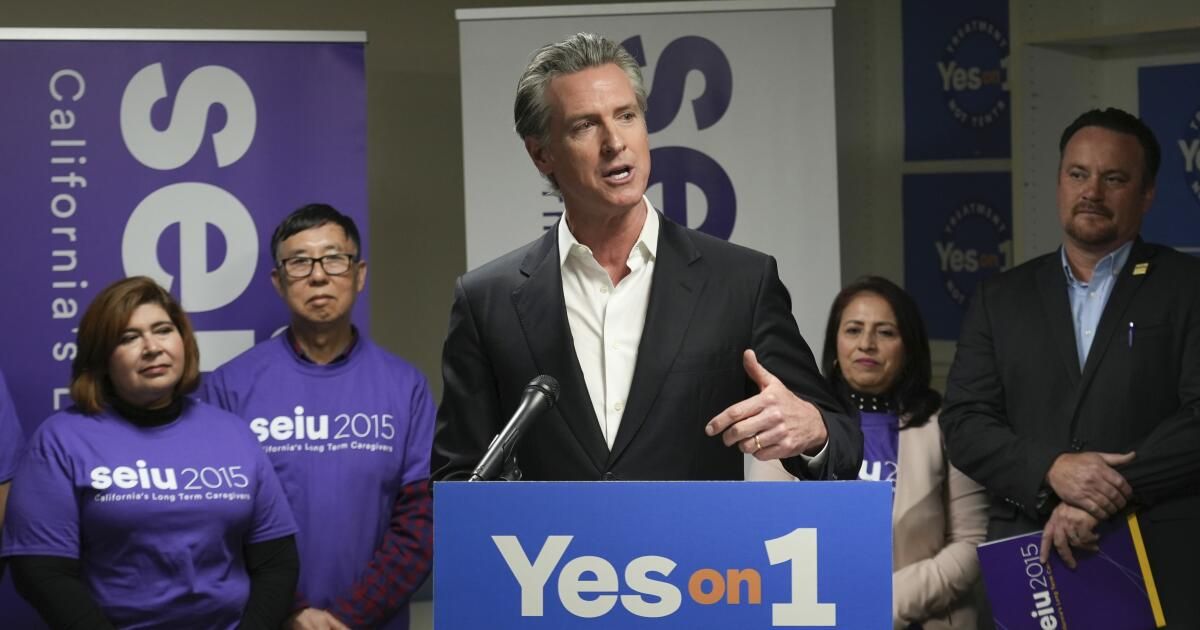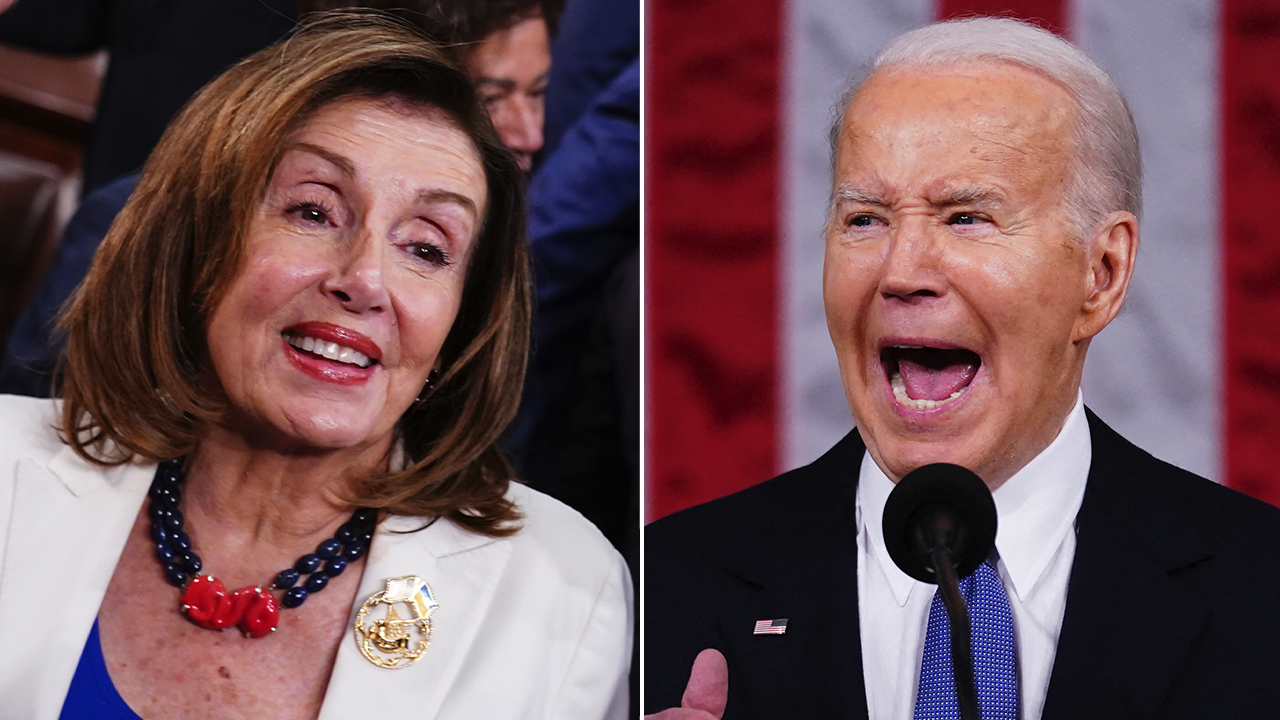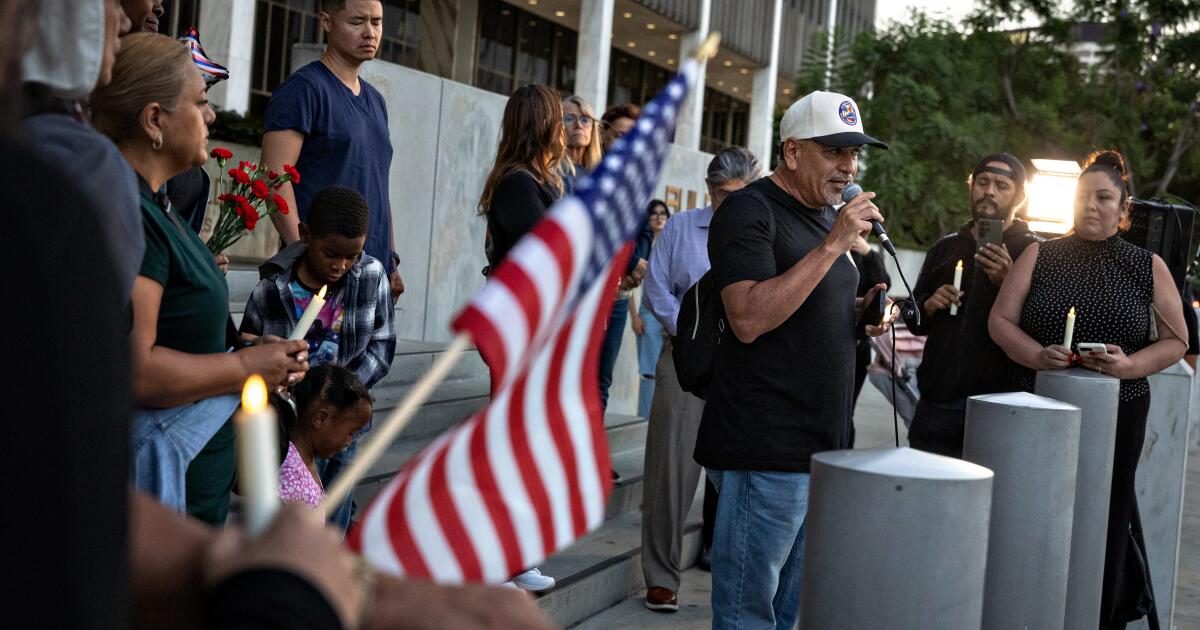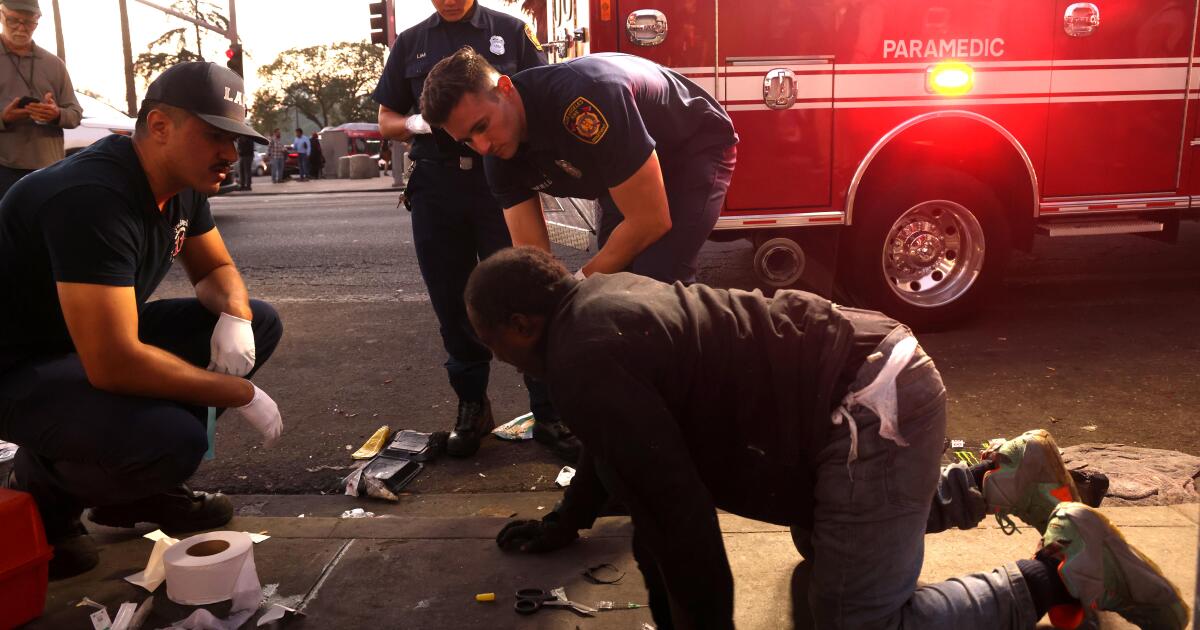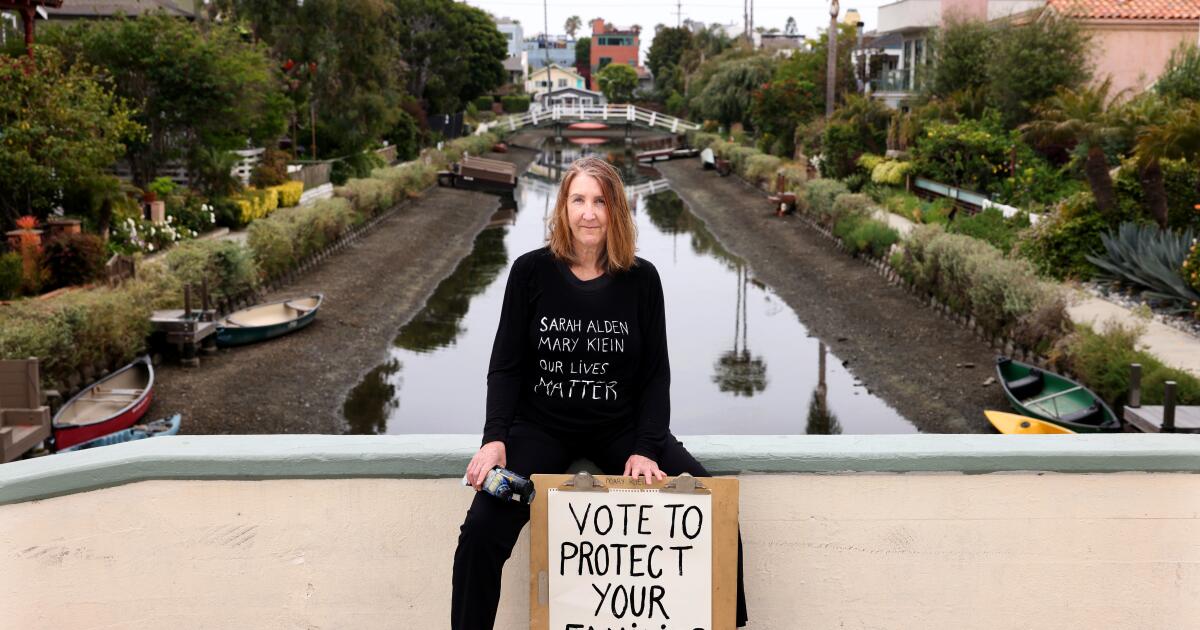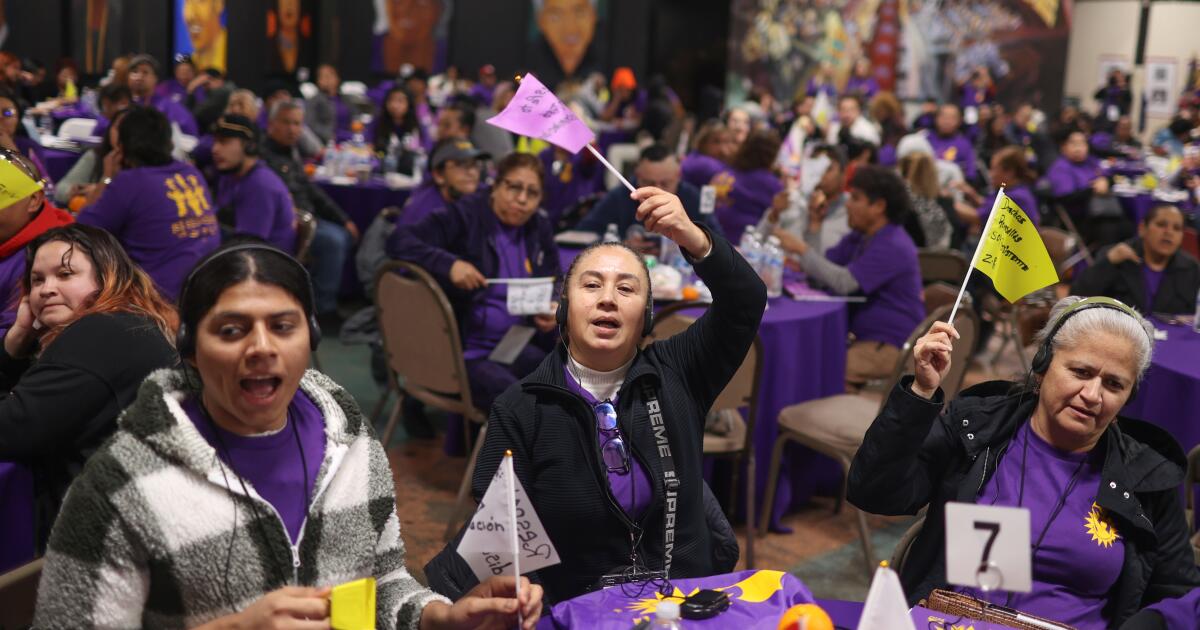Gov. Gavin Newsom exuded confidence about Proposition 1 in January while sitting in a room at the Costa Mesa Motel 6 that was converted into housing for homeless veterans.
“I think he's going to win overwhelmingly,” the governor said in an interview with The Times. “Period. End point.”
Nearly two months later, Newsom's arrogance seems misplaced.
Despite millions spent on his campaign, Newsom's ballot measure to increase drug addiction care and fund more treatment beds has maintained only a narrow lead since the March 5 primary. Still too close to officially call more than a week after the election, the California secretary of state's preliminary counts showed Proposition 1 ahead by less than a percentage point.
Even with that uncertainty, the poorly funded opposition campaign admitted Tuesday morning that it was “almost certain” the measure would pass.
“We almost took down the bear, but it looks like we will fall short,” the Californians Against Proposition 1 campaign said in a statement.
Newsom's campaign said it was “optimistic” about the outcome, but there are still votes to be counted. More than 1.5 million votes remain uncounted statewide in an election that is expected to top 7.5 million votes total, which could be one of the lowest turnouts in state history.
The Associated Press, which member news organizations rely on to read results and call elections, said in a statement that “the race could change if the 'No' poll is just 1.5 percentage points better among the outstanding votes.”
“AP has determined that there is too much uncertainty to make a decision at this time, as results across the state are uneven.”
Pollsters say Proposition 1 (and most Democratic candidates) underperformed on Election Day because of lower-than-expected voter turnout that inflated the Republican share of the electorate. Election results showed that inland counties and parts of Southern California opposed the measure, while a majority of voters in Los Angeles and the Bay Area backed the plan.
“It was the angry versus the apathetic,” said Jim DeBoo, a Prop 1 consultant. “The Republicans are angry and they showed up.”
Although Newsom's proposal received rare bipartisan support from Central Valley Republicans and San Francisco Democrats in the state Legislature, that political harmony did not extend to voters. The measure was criticized by left-wing civil rights groups who were concerned about the repercussions of funding secure mental health facilities and their right-wing Republican opponents who scoffed at the estimated $14 billion price tag amid a massive state budget deficit. .
Proposition 1 would approve a new $6.4 billion bond to support 10,000 treatment beds and housing and reconfigure a 20-year tax on mental health services to also fund drug addiction services. The plan is essential to Newsom's strategy to address California's homelessness crisis, a persistent obstacle for the state and political vulnerability for the Democratic governor.
Under increasing pressure to clean up camps and get people into treatment, the governor has taken a number of policy positions that move away from the liberal model of voluntary treatment toward a more moderate approach of forcing people with serious mental illnesses and substance disorders to receive medical attention.
Newsom signed a law last year to expand guardianship and allow courts to appoint someone to make decisions for people struggling with serious substance use disorders. Counties began implementing their CARE Court program, which gives families the opportunity to petition the courts to require treatment for a loved one, last year.
The lack of treatment beds and places to house an influx of patients has been the main argument against Newsom's strategy. In her State of the City address days after the election, San Francisco Mayor London Breed touted that passage of Proposition 1 would provide “a real opportunity to add hundreds more” treatment beds.
“So when the state clears the way for new beds, San Francisco will be ready and first in line,” Breed said.
Civil rights organizations and disability community advocates opposed the measure and raised alarms in 2023 over a last-minute change to Proposition 1 that allows counties to use bond money for “closed facilities.” , where patients cannot leave voluntarily.
The American Civil Liberties Unions in California and the League of Women Voters of California urged voters to reject the measure, arguing that community mental health services are more effective than institutionalization.
“I think the governor and mayors often just want the encampments to go away by any means necessary,” said Katherine Wolf, a doctoral student in society and environment at UC Berkeley, who said she voted against Proposition 1.
Wolf said he believes community programs that provide stability for some Californians with mental illness will lose funding if money goes to involuntary treatment. Like the ACLU and the League of Women Voters, she also opposes forcing people into care.
“I think it's really dishonest that they snuck it in at the last minute after promising all summer that the voucher would only be used for unlocked community-based voluntary treatment and I think they did it specifically to avoid objections from groups and people. who they knew would oppose it,” Wolf said.
Newsom presented the measure as an opportunity to get more people off the streets and into treatment. The measure, he argued in an interview with The Times, addressed the issues most important to voters (crime, homelessness, substance abuse and mental health) and “the 90% of the ballot boxes that unite the overwhelming majority of voters.” Californians.”
Early polls seemed to suggest Newsom was right. A poll conducted by the Public Policy Institute of California in November, for example, suggested that two-thirds of likely voters approved of Proposition 1, 30% opposed it, and just 2% remained undecided.
But despite the governor's publicly optimistic stance, behind the scenes his campaign predicted that the final result would end up being closer than the polls showed and tried to lower expectations in the months and weeks leading up to the election.
Support fell to 59% among likely voters in a second PPIC poll conducted in February.
By the end of the month, the measure was hovering at just 50% support in a UC Berkeley Institute of Government Studies poll co-sponsored by the Los Angeles Times. More than a third of voters opposed it and 16% remained undecided. A large majority of Republican voters who responded to the Berkeley poll opposed the measure, raising concerns about how Proposition 1 would fare in an election with higher Republican turnout.
In a memo sent days before the election, David Binder, a pollster hired by Newsom's campaign, suggested the PPIC polls were optimistic given low turnout and poor performance among Democrats.
“It is likely that although the yes vote on Proposition 1 may have scored around 60 when it was first introduced in 2023, the yes vote could end up around 50, given the history of eroding support for the measures.” of bonds and taxes and the specific details about the low turnout and disproportionate Republican turnout that California is experiencing in the March 5 elections,” Binder wrote.
Mark DiCamillo, director of the IGS poll, said that despite bipartisan support in the state Capitol, it should not be surprising that Republican voters did not support Proposition 1.
Republicans tend to oppose costly ballot measures. Voters of all political affiliations who remain undecided in the final days before an election also often end up voting against a measure if they are undecided, he said. Complicated measures, like Proposition 1, can also easily confuse voters.
“Another difference that probably worked against us in this election was that turnout was so low that there are basically three times as many older voters, who tend to be more conservative than younger voters,” DiCamillo said.
Newsom's campaign said the governor intentionally chose to put the measure on the March ballot because he believed it could “withstand a more conservative electorate and still pass on Election Day” and because of the urgency of the issue.
Campaign spokesman Anthony York said (and pollsters agreed) that the measure would have fared better if it had been on the November ballot, where Democratic turnout is expected to be higher.
But Democrats in Sacramento are also considering other housing, schools and climate bond measures to put before voters in November that could total tens of billions of dollars. As the state struggles to make up for a budget shortfall of at least $37.9 billion, the bonds act as a kind of way for the government to obtain loans paid back over time to finance costly policies.
Voting on Proposition 1 in March instead of November was a strategic decision that allowed Newsom to avoid a crowded vote in the fall, said Paul Mitchell, vice president of Political Data Inc.
“Voters, if they pile on ballot measures that involve spending, they start to collectively say 'no' to them,” Mitchell said.
Times staff writer Hannah Wiley contributed to this report.

